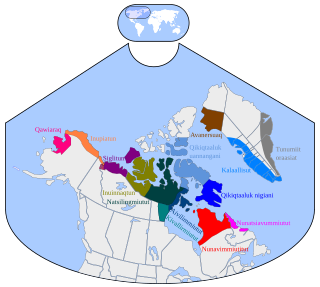Sallirmiutun
| Sallirmiutun | |
|---|---|
| Siglitun | |
| Native to | Canada |
| Region | Northwest Territories (Canada), as "Inuvialuktun" |
Eskaleut
| |
Early forms | |
| Language codes | |
| ISO 639-3 | – |
| Glottolog | sigl1242 |
 Inuit dialects. Siglit is purple. | |
 Siglitun is classified as Severely Endangered by the UNESCO Atlas of the World's Languages in Danger | |

Siglitun: Aqana Tuktuuyaqtuumukkabsi
Sallirmiutun (formerly Siglitun)[1] is the dialect of Inuvialuktun spoken by the Siglit, an Inuit group of the Northwest Territories, Canada. It is mainly used in the Inuvialuit communities of Paulatuk, Sachs Harbour and Tuktoyaktuk.[2] Sallirmiutun was once the principal dialect of the Mackenzie River delta, nearby parts of the coast and Arctic Ocean islands, but the number of speakers fell dramatically following outbreaks of new diseases in the 19th century and for many years Sallirmiutun was believed to be completely extinct. It was only in the 1980s that outsiders realised that it was still spoken.
Sallirmiutun means "the language of the people of the coast" referring to the Beaufort Sea. It is the original dialect of the people from Kitigaaryuit.
It is one of the three dialects, along with Kangiryuarmiutun and Uummarmiutun, of Inuit language grouped together under the label Inuvialuktun. In fact, the word Inuvialuktun, meaning "the language of the real people" is a Sallirmiutun dialect word.
Phonology
[edit]The following is the phonology of the Siglitun dialect:[3]
Vowels
[edit]| Front | Back | |
|---|---|---|
| Close | i | u |
| Open | a | |
Consonants
[edit]| Labial | Alveolar | Palatal | Velar | Uvular | |||
|---|---|---|---|---|---|---|---|
| plain | lateral | ||||||
| Nasal | m | n | ŋ | ||||
| Plosive/ Affricate |
voiceless | p | t | tʃ | k | q | |
| voiced | b | dʒ | |||||
| Fricative | v | s | ɬ | j | ɣ | ʁ | |
| Approximant | l | ||||||
Vocabulary comparison
[edit]The comparison of some animal names in the Siglitun dialect of Inuvialuktun language and Uummarmiutun dialect of the Iñupiatun language:[4]
| Siglitun | Uummarmiutun | meaning |
|---|---|---|
| siksik | hikȓik | ground squirrel |
| qugyuk | qugȓuk | tundra swan |
| ugyuk | ugȓuk | bearded seal |
| tigiaqpak | itigiaqpak | mink |
| qavviasiaq | qavviatchiaq | marten |
| tigiaq | itiriaq | weasel |
| tatidjgaq | tatiȓgaq | sandhill crane |
| ivugaqpak | kuȓugaqpak | mallard |
| aqidjgiq | aqȓgiq | willow ptarmigan |
| isun’ngaq | ihun’ngaq | jaeger |
| piqtusiraq | pamiuquuq | otter |
References
[edit]- ^ Nagy, Murielle (17 October 2022). "Inuvialuit Ethnonyms and Toponyms as a Reflection of Identity, Language, and Memory". In Kenneth L. Pratt; Scott A. Heyes (eds.). Memory and Landscape: Indigenous Responses to a Changing North. Athabasca University Press. doi:10.15215/AUPRESS/9781771993159.01. ISBN 978-1-77199-316-6. Wikidata Q126723202.
- ^ IRC - Languages
- ^ Lowe, Ronald (1985). Siglit Inuvialuktun Uqausiita Ilisarviksait: Basic Siglit Inuvialuktun Grammar. Committee for Original Peoples Entitlement. pp. 297–298.
- ^ Inuvialuit Settlement Region – TK Study, August 2006
